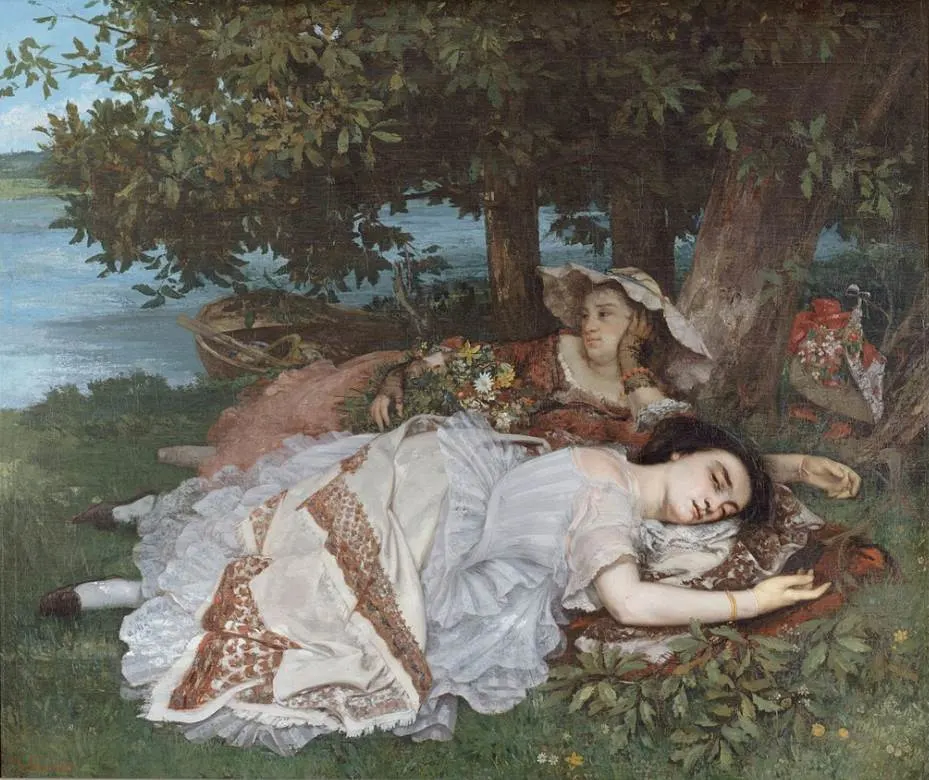It takes a lot of willpower to break with established traditions, and this was something that Gustave Courbet (1819-1877) was up for. He rejected the academic standards and the ideals of the Romantic artists who came before him.
He became the leading Realism artist of the 19th century because he only painted what he could observe himself, resulting in an oeuvre that is defined by paintings that influenced future generations.
Some of the artists he influenced were the Impressionist artists later that century and the Cubist artists in the early 20th century. This makes him one of the most famous French artists of the 19th century.
Let’s take a closer look at some of the most famous Gustave Courbet paintings so you can learn more about the realistic style he employed throughout his career.
1. The Painter’s Studio
- Date created: 1854-1855
- Dimensions: 361 × 598 centimeters (142 × 235 inches)
- Location: Musée d’Orsay, Paris, France
The Painter’s Studio was originally named “The Painter’s Studio: A real allegory summing up seven years of my artistic and moral life,” a title that emphasizes the importance of the work according to the artist himself.
This was mainly the reason why he set up his pavilion right next to the 1855 WOrld Fair called “Le Pavillion du Realisme” after the jury rejected the work. His defiance would eventually culminate in the Salon des Refusés, an exhibition for paintings that didn’t make it to the prestigious Paris Salon.
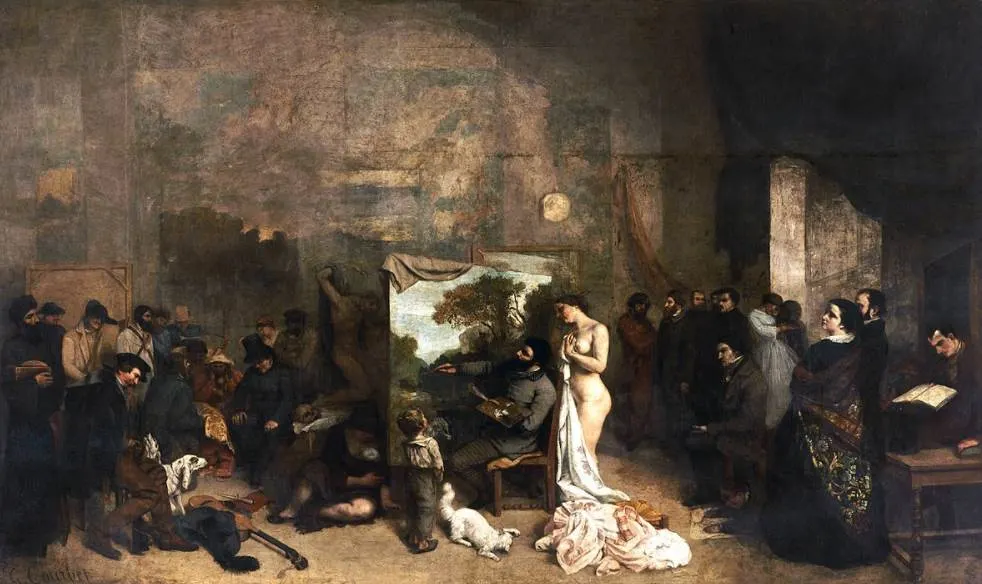
2. A Burial at Ornans
- Date created: 1849-1850
- Dimensions: 315 × 660 centimeters (124 × 260 inches)
- Location: Musée d’Orsay, Paris, France
A Burial at Ornans was one of the works that put Gustave Courbet on the artistic map in Paris. It’s a realistic representation of an actual event that the artist attended, the burial of his great uncle in the small town of Ornans.
Because Courbet grew up in this small town, he knew just about everybody who attended the burial and realistically depicted these people. It could be compared to the famous painting by El Greco called “The Burial of the Count of Orgaz” (1587) in which he also realistically depicted people he knew.
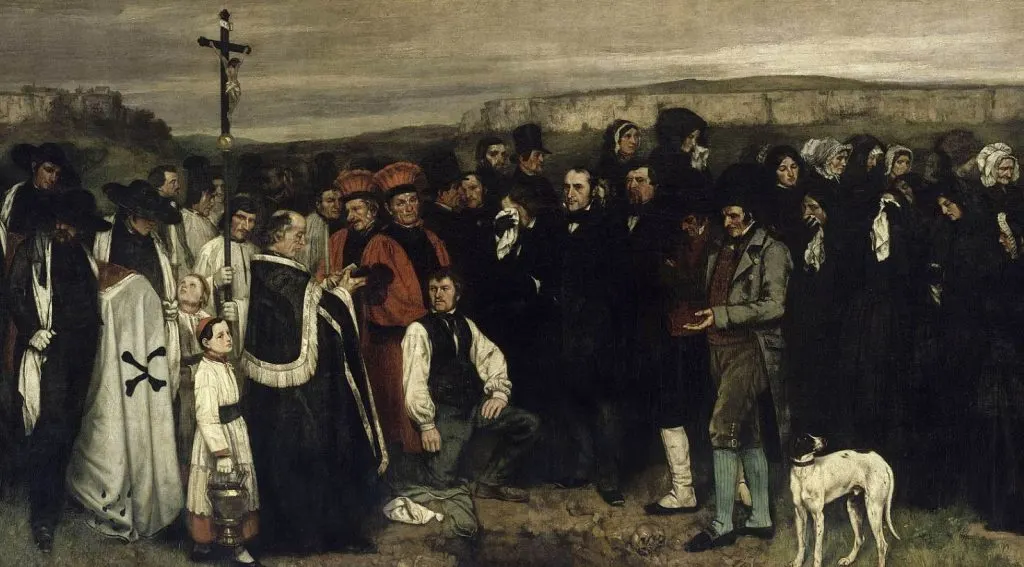
3. The Desperate Man
- Date created: 1845
- Dimensions: 89 x 99 centimeters (35 x 38.9 inches)
- Location: Private collection
The Desperate Man or “Le Désespéré” is a self-portrait by Gustave Courbet that he produced shortly after arriving in Paris. This early work was a period in which he experimented with Romantic subjects, something he quickly rejected afterward.

Because he discovered the famous paintings by Diego Velázquez and Rembrandt van Rijn at the Louvre Museum, he changed his style to only paint the things that he could observe. It’s one of the most intriguing Gustave Courbet paintings because he held onto it until the day he died.
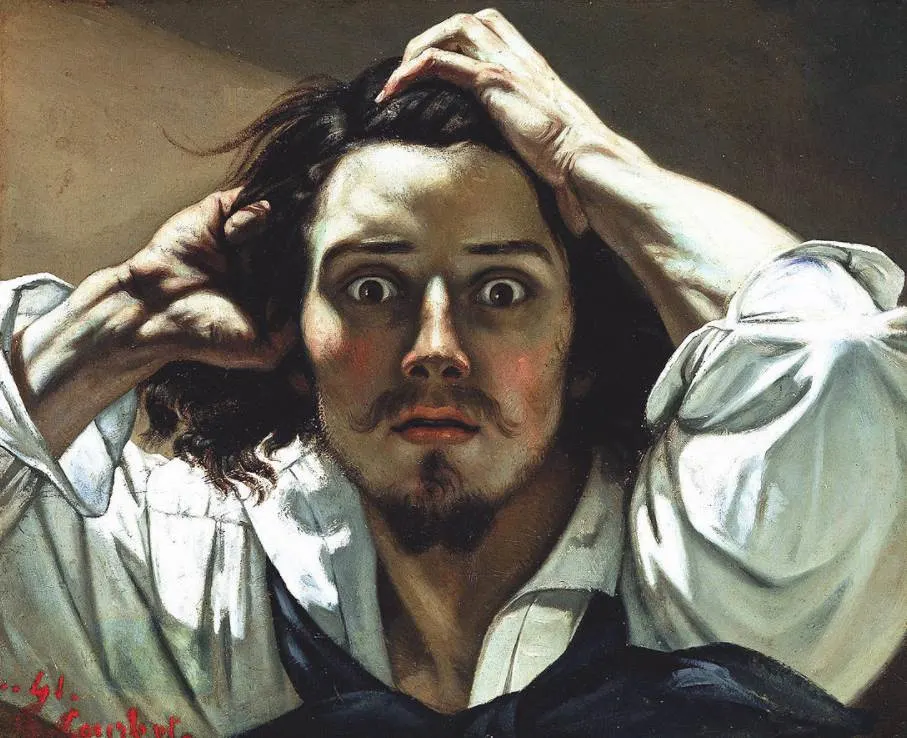
4. The Meeting (Bonjour, Monsieur Courbet)
- Date created: 1854
- Dimensions: 129 × 149 centimeters (51 × 59 inches)
- Location: Musée Fabre, Montpellier, France
La Rencontre or “The Meeting” is a painting that depicts Gustave Courbet as he encounters one of his major patrons, Alfred Bruyas, his servant, and his dog. The company appeared to be on its way to the French city of Montpellier.
This is one of the 11 paintings that did make it to the 1855 Exhibition Universelle but it was ridiculed when it was hung there by contemporary art critics. That’s why it was mockingly referred to as “Bonjour, Monsieur Courbet.”
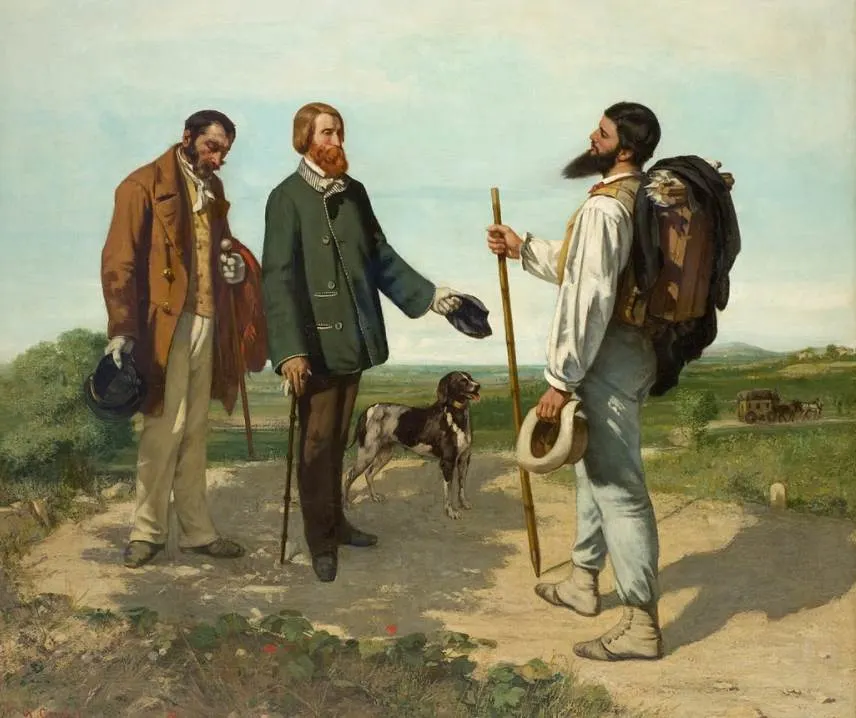
5. Woman with a Parrot
- Date created: 1866
- Dimensions: 129.5 × 195.6 centimeters (51 × 77 inches)
- Location: Metropolitan Museum of Art, New York City, United States
Woman with a Parrot is one of the many nude paintings by Gustave Courbet but it has a special place in his oeuvre. It was the first nude to be accepted by the Paris Salon, something that happened in the year 1866.
Because of the realistic nature of his painting without a clear mythological subject, these were often considered to be indecent. That’s the main reason why this one was accepted and a previous entry in 1864 was rejected.
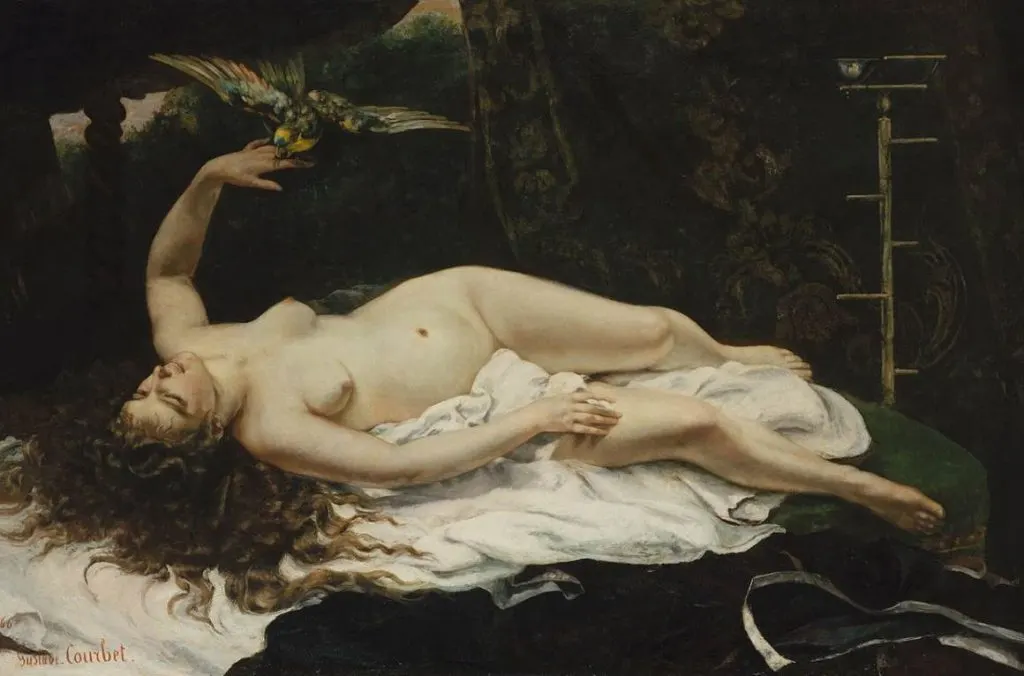
6. The Bathers
- Date created: 1853
- Dimensions: 227 × 193 centimeters (89 × 76 inches)
- Location: Musée Fabre, Montpellier, France
The Bathers is one of the many paintings by Gustave Courbet that caused a bit of a stir at the. His reputation got a bit of a dent following the display of this painting at the Paris Salon in 1853 after his major success with the Burial scene at Ornans a couple of years earlier.
Despite the negative reception of just about every art critic in Paris, it was still acquired for the hefty sum of 3,000 francs by his main patron and friend Alfred Bruyas. It marked the start of an independent career in which he wasn’t reliant on constantly making sales without being able to develop his artistic style.
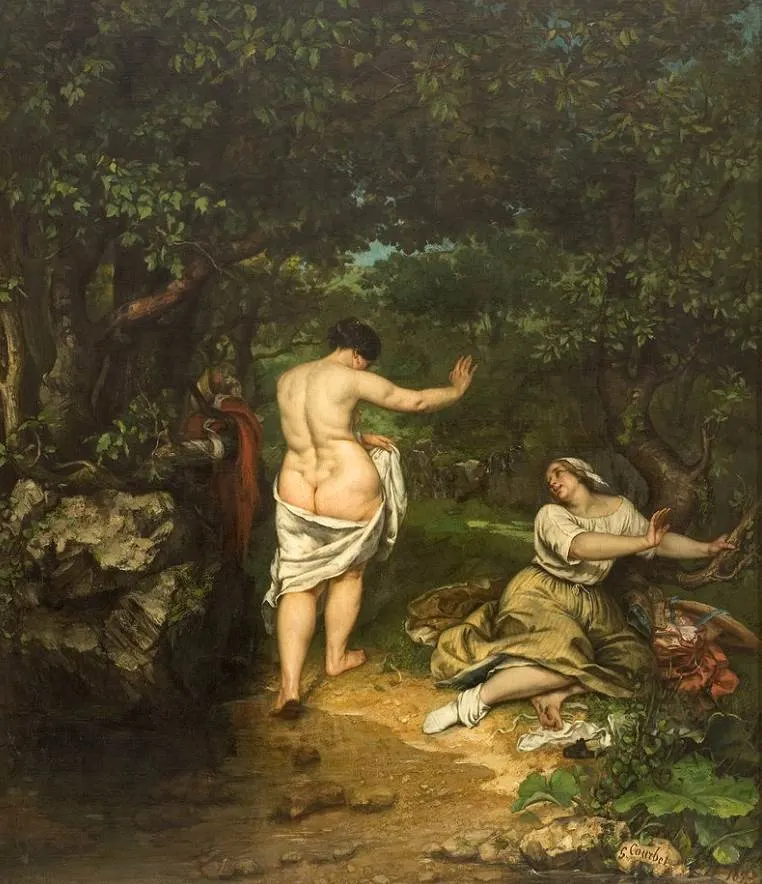
7. After Dinner at Ornans
- Date created: 1848-1849
- Dimensions: 195 x 257 centimeters (76.77 x 101.18 inches)
- Location: Palais des Beaux-Arts de Lille
After Dinner at Ornans is another painting that depicts a common scene in the hometown of the artist. He had returned to Ornans in October of the year 1848 and painted it along with his famous work “The Stone Breakers.”
Luckily, this painting didn’t suffer the same faith as the work considered to be one of his first great paintings. The Stone Breakers was destroyed by allied bombing during World War II along with 152 other paintings;
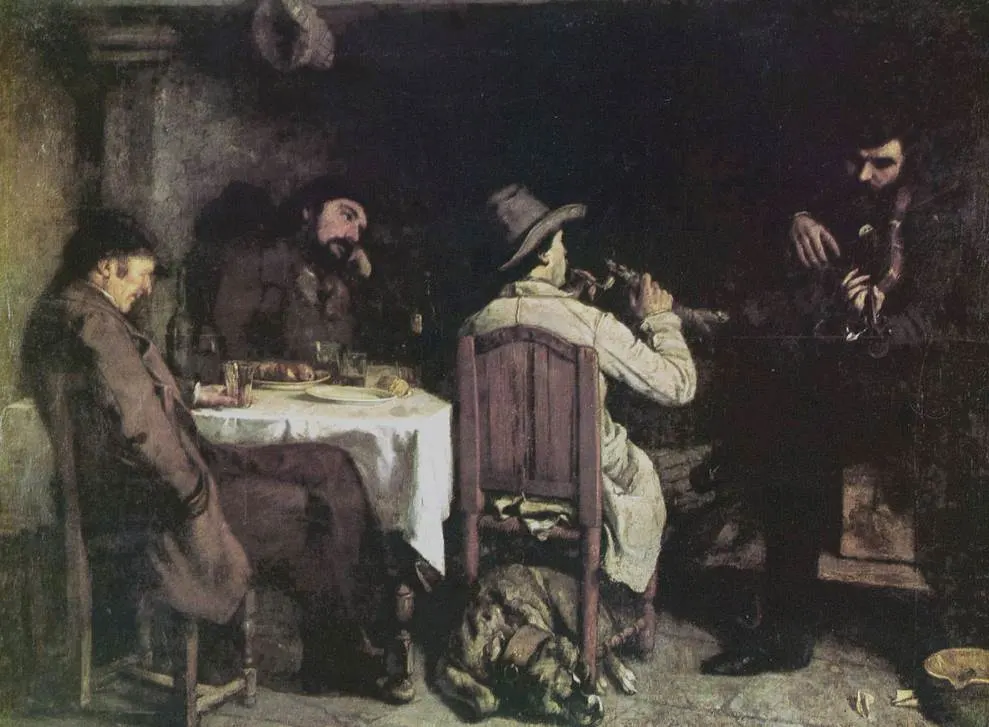
8. The Woman in the Waves
- Date created: 1868
- Dimensions: 65.4 × 54 centimeters (25.7 × 21 inches)
- Location: Metropolitan Museum of Art, New York City, United States
The Woman in the Waves or “La Femme à la vague” is a very realistic depiction of a nude woman. Especially the tone of flesh was painted with such a level of detail that the women’s breasts almost appear to be photographic.
It’s a relatively small painting that made its way to the United States as it can be admired at the Metropolitan Museum of Art, one of the most famous museums in the United States.
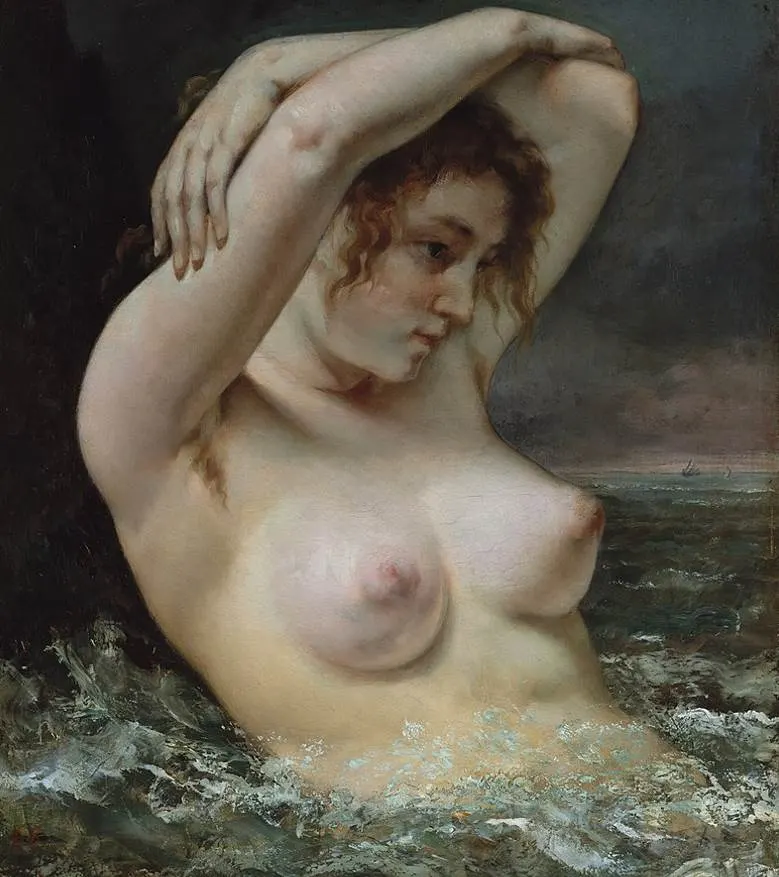
9. The Calm Sea
- Date created: 1869
- Dimensions: 59.7 × 73 centimeters (23.5 × 29 inches)
- Location: Metropolitan Museum of Art, New York City, United States
The Calm Sea is one of the multiple seascapes painted by Gustave Courbet. It depicts a stretched-out beach on the Normandy Coast before the English Channel.
The painting is remarkable because it features an enormous sky full of clouds which covers large parts of the painting. The boats in the sea and on the beach are dwarfed in comparison.
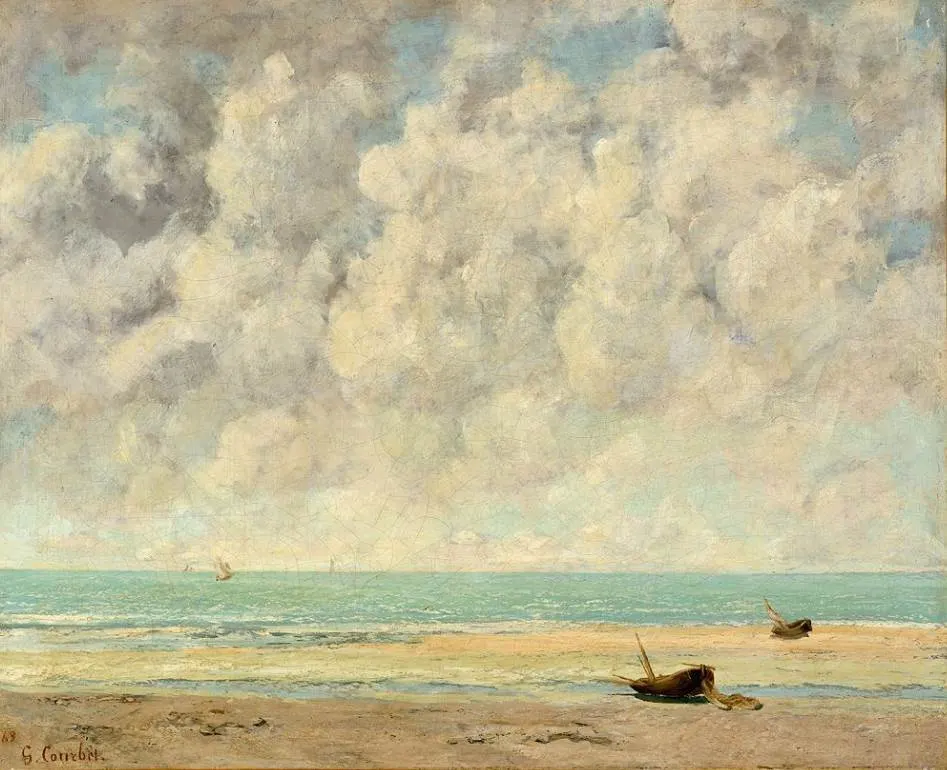
10. Young Ladies on the Banks of the Seine
- Date created: 1856-1857
- Dimensions: 174 × 206 centimeters (69 × 81 inches)
- Location: Petit Palais, Paris, France
Young Ladies on the Banks of the Seine or “Young Ladies Beside the Seine” is one of the 6 paintings that was accepted by the jury of the Paris Salon in the year 1857. It was exhibited that year along with 3 of Courbet’s landscapes and 2 portraits.
The painting was acquired by another patron and friend of the artist, a man named Étienne Baudry (1830-1908). His sister eventually donated it to the French state in 1906, the main reason why it can now be admired at the Petit Palais in Paris.
